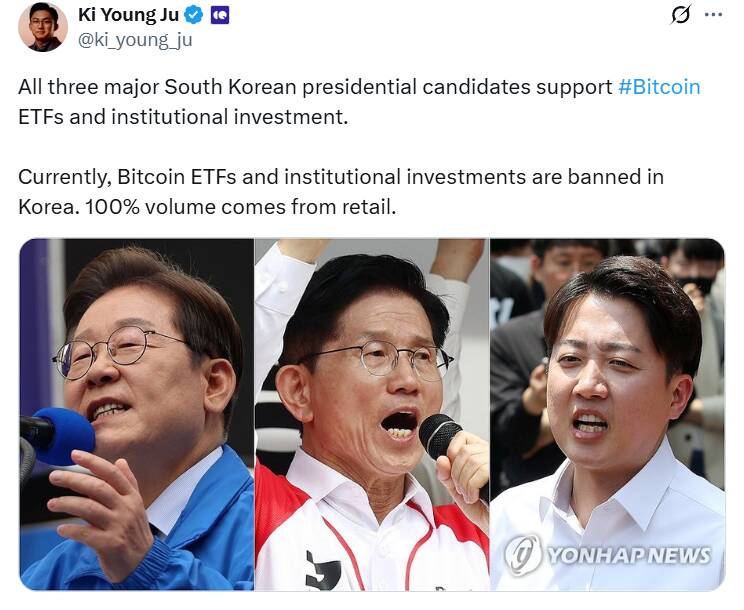Exciting developments are brewing in South Korea’s cryptocurrency landscape, as the country’s leading presidential candidates have publicly expressed their support for spot Bitcoin exchange-traded funds (ETFs). Following in the footsteps of Hong Kong, which recently launched its own crypto ETFs, there’s a growing buzz about potential regulatory changes that could allow institutional investment in digital assets. Currently, South Korean regulations prohibit Bitcoin ETFs, with all trading activity limited to retail investors. This scenario has fueled speculation about what these pro-crypto positions could mean for the future of cryptocurrency in the nation.
Ki Young Ju, the CEO of the onchain data platform CryptoQuant, highlighted the support for Bitcoin ETFs among all three major presidential candidates, indicating a possible shift in policy direction. Democratic Party leader Lee Jae-myung has even made promises to not only legalize spot crypto ETFs but also to reduce transaction fees, aiming to create a safer investment environment for the younger generation. These commitments have been echoed by other candidates, suggesting a collective ambition to modernize the country’s approach to cryptocurrency.
However, despite this optimistic rhetoric, industry experts urge caution. Anndy Lian, an author and blockchain adviser, pointed out that while these pledges signal a potential shift, the past experiences of previous administrations set a precedent for skepticism. He noted that similar promises have been made before, but tangible action has often lagged behind, raising questions about the likelihood of quick regulatory changes.
“A pro-crypto president could drive reform, aligning South Korea with global trends like the US, where Bitcoin ETFs have attracted billions in net inflows,” Lian remarked, indicating that the potential remains high despite the hurdles.
As South Korea stands on the brink of transformation in its digital asset landscape, the future of Bitcoin ETFs hangs in the balance, weaving together the threads of political ambition, regulatory landscape, and investor sentiment.
South Korea’s Potential Move Towards Bitcoin ETFs
South Korea is considering legalizing spot Bitcoin exchange-traded funds (ETFs), an initiative supported by major presidential candidates, but skepticism remains regarding the likelihood of actual regulatory changes.
- Presidential Candidates Support Bitcoin ETFs:
- All three major candidates in South Korea’s presidential race have expressed their pro-crypto positions.
- Lee Jae-myung, from the Democratic Party, has specifically promised to legalize spot crypto ETFs and lower transaction fees.
- Current Crypto Climate:
- Currently, Bitcoin ETFs and institutional investment are banned in South Korea, leading to a retail-dominated market.
- Pro-crypto pledges from candidates indicate a potential economic shift towards digital assets.
- Historical Doubts:
- Experts remain cautious due to past failures of the People Power Party to act on similar promises.
- Regulatory history suggests that while there is a desire for reform, actual implementation may take longer than expected.
- Comparisons with Hong Kong:
- Similar legislation in Hong Kong has led to the launch of Bitcoin and Ether-based ETFs, but trading has been lackluster compared to the US markets.
- South Korea might face similar challenges in adopting a successful ETF framework.
- Young Investors’ Future:
- Legalizing Bitcoin ETFs could create opportunities for young South Koreans to engage in cryptocurrency investments.
- A safe investment environment could potentially foster financial literacy and asset building among youth.
“A pro-crypto president could drive reform, aligning South Korea with global trends.” – Anndy Lian
South Korea’s Potential Shift Towards Bitcoin ETFs: A Comparative Analysis
The landscape of cryptocurrency regulation is shifting, and South Korea’s potential legalization of spot Bitcoin exchange-traded funds (ETFs) has sparked a debate reminiscent of Hong Kong’s recent foray into this arena. While the commitment from South Korea’s major presidential candidates to endorse Bitcoin ETFs is a promising indication of pro-crypto sentiment, the cautious optimism surrounding this shift bears examination.
On one hand, the support from key political figures like Lee Jae-myung and Kim Moon-soo could facilitate a more robust institutional investment environment, fostering greater financial inclusion for young citizens eager to engage with digital assets. The successful launch of Bitcoin ETFs in Hong Kong initially offered hope, but mixed trading volumes compared to the US markets could serve as a vital lesson for South Korea. It’s critical to recognize that, while legislation may open doors for institutional investment, it doesn’t guarantee the same level of enthusiasm or market liquidity that is seen elsewhere—especially given that Hong Kong’s early success did not reach expected heights.
However, the historical context of South Korea’s legislative challenges casts a shadow over these prospects. Previous promises by the People Power Party to lift the crypto ETF ban were unmet, raising questions about the actual willingness and ability of political leaders to follow through on their pro-crypto rhetoric. This creates a dual-edged sword; while the potential for change exists, the skepticism of regulation experts can dampen the enthusiasm within the investment community. If expectations aren’t met, it could dishearten retail investors, who make up the entirety of the current volume, and affect the perceived reliability of future political commitments.
From a competitive standpoint, South Korea’s engagement in the ETF space realistically positions it to align with global movements, similar to the US, where significant net inflows to Bitcoin ETFs have been observed. This could appeal to institutional investors seeking regional diversification in a jurisdiction that may become more crypto-friendly. However, if the regulatory framework remains unclear or cumbersome, it could deter foreign investment and push local investors towards more lenient environments like Hong Kong or the US—where market opportunities exist alongside established regulatory frameworks.
In essence, while the pro-crypto stance from leading candidates creates a potentially favorable environment for innovative investments, history suggests caution. The primary beneficiaries could be institutional players looking to enter a burgeoning market, whereas retail investors may find it challenging to navigate a terrain marked by uncertainty. The emphasis on establishing credibility through actionable policies will ultimately determine whether South Korea can successfully emulate the global success of Bitcoin ETFs or fall behind its regional counterparts.

















